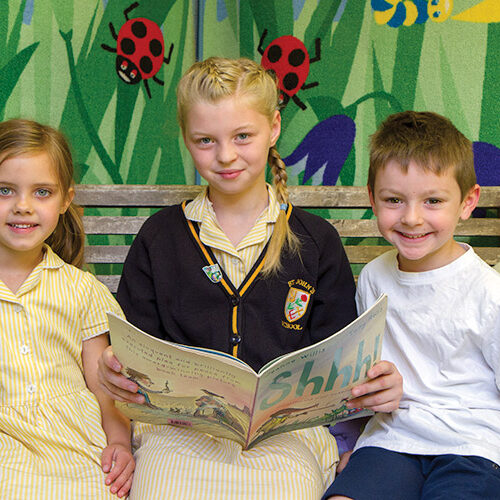
At St. John’s we are committed to creating skilled, confident readers who are eager to access the curriculum. The benefits of being a frequent and enthusiastic reader are well documented. The more you read and enjoy reading, the better and more confident you become at reading and the more you want to do it. Reading at St. John's consists of several components, the main ones being:
Phonics
At St. John’s, we use a synthetic phonics programme called Read, Write, Inc. Read, Write, Inc. is a method of learning centred around letter sounds and phonics, blending them together to read and write words and using these learnt sounds in their reading and writing. Using Read, Write, Inc., the children learn to read effortlessly so that they can put all their energy into comprehending what they read. It also allows them to spell effortlessly so that they can focus on composing what they write.
Children are regularly assessed and grouped according to their reading stage and they work with a teacher or teaching assistant in a small group. The children are continuously assessed by the Reading Leader, to ensure that they move through the programme at a good pace.
 Reading
Reading
At St. John’s, we are determined that every pupil will learn to read, regardless of their background, needs or abilities. We ensure all pupils, including the weakest readers, make sufficient progress to meet or exceed age-related expectations.
We do this through:
- Story time every day
- Daily phonics teaching in EYFS and KS1 to support decoding and comprehension skills
- A text led curriculum using high quality texts
- Echo reading
- Guided reading
- Reading competitions
- Organising for parent volunteers to listen to children read
- Book Weeks
- Highly engaging class book corners that are well stocked
We use a wide range of different books to help children learning to read. It is important that children have access to lots of different kinds of books so that they develop a real love of reading and literature These include familiar picture books which children can browse through for pleasure as well as books which are banded into different colours. Children take these books home to read and progress through them before they move onto free choice books from the library.
As children make progress and are reading sentences fluently, they begin to use punctuation in the text to help them read with expression and intonation. This in turn helps the reader understand the meaning more fully. By then, children are using a range of strategies to decode unfamiliar words and begin to self-correct when they stumble over a tricky word. As children develop in their reading, the emphasis changes from learning to read to reading to learn, where the balance of word recognition and language comprehension changes. Language comprehension will be developing alongside the growing skills of word recognition.
Children love stories and becoming very familiar with key stories, fairy stories and traditional tales is a valuable part of learning to read. Retelling these familiar stories really helps children’s confidence. They learn predictive skills and are able to discuss the characters and main events of the story. The repetitive phrases in these books allow the children to join in and learn the book off by heart. At school, we read and re-read these books as well as a wide range of rhymes, poetry, stories and non-fiction. Children learn to talk with confidence about the characters in a story, or the main events, for example.
As children develop, they begin to express their own preferences and opinions showing a deeper understanding of narrative. They begin to ’read between the lines’ to answer questions, showing empathy for characters and are able to refer to specific parts of a text.
One of the most important ways parents can help their children is in encouraging their reading and helping them to develop a love of books. The support of parents is so important in making time to listen to children read every day. Reading aloud to children, both at school and at home, is critically important in developing language and thinking skills. Above all, enjoyment of books fosters imagination and a wider understanding of the world.
Even when children become older, even if they are not reading aloud to an adult any more, it is important to keep engaging them in talking about books and loving reading.
“There are many little ways to enlarge your child’s world. Love of books is the best of all” - Jacqueline Kennedy Onassis
Reading is the key that unlocks the curriculum and so if children are given the opportunity to relate reading for pleasure to all areas of the curriculum, it will help them to understand the relevance of subjects to the real world.


